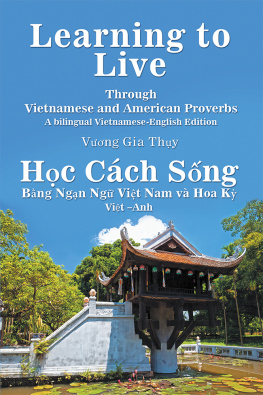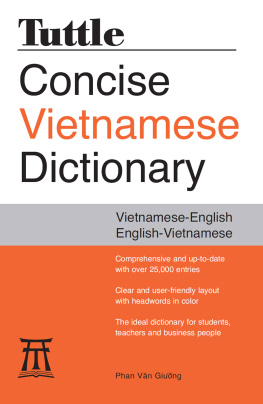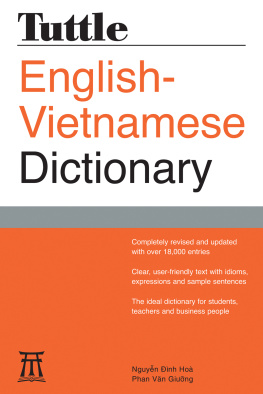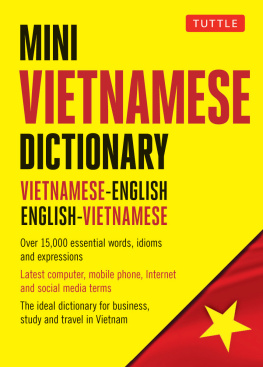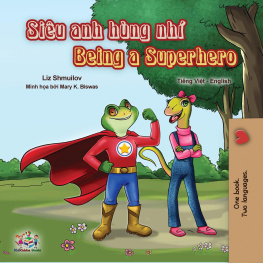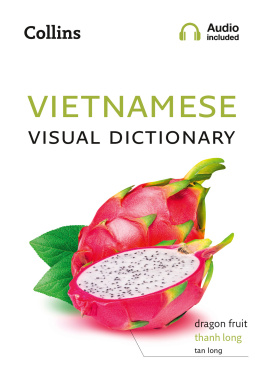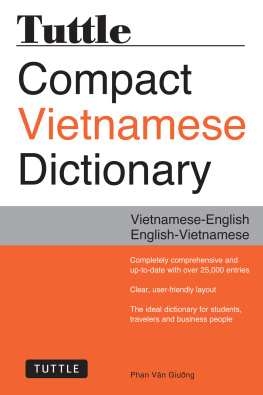Learning to
Live
Through
Vietnamese and American Proverbs A Bilingual Vietnamese-English Edition Vng Gia Thy Hc Cch Sng
Bng Ngn Ng Vit-Nam v Hoa-K VitAnh Copyright by Vng Gia Thy.
| Library of Congress Control Number: | 2018908531 |
| ISBN: | Hardcover | 978-1-9845-4145-1 |
| Softcover | 978-1-9845-4144-4 |
| eBook | 978-1-9845-4143-7 |
All rights reserved. No part of this book may be reproduced or transmitted in any form or by any means, electronic or mechanical, including photocopying, recording, or by any information storage and retrieval system, without permission in writing from the copyright owner. Any people depicted in stock imagery provided by Getty Images are models, and such images are being used for illustrative purposes only. Certain stock imagery Getty Images. date: 10/12/2018 Xlibris 1-888-795-4274 www.Xlibris.com 781557 TABLE OF CONTENTS Mc Lc Ngn Ng Vit-Nam (Theo Ti) Mc Lc Ngn Ng Vit-Nam (Theo Ch Ci) Bng Lit K Cp Cu Ngn Ng Vit-M (Theo Ch Ci) Mc Lc Ngn Ng Hoa-K (Theo Ch Ci) To my beloved parents and wife Maria, my children and grand children and also to Sylvia Coudoux for having inspired me to write this book and to all those who need wisdom and value a life with virtue and decency Cm T Cun sch ny c thnh hnh nh lng knh mn Cha M v tnh yu cho Maria, cc con v cc chu, v s gip tn tnh ca Sylvia Coudoux Ngoi ra Cng xin tng cun sch ny cho nhng ai cn c nhng s khn ngoan i v mun c mt i sng o c v theo ng t cch con ngi This bilingual English-Vietnamese book was written in simple Vietnamese and English for easy reading and comprehension of the intended messages without requiring a high level of reading abilities in either or both languages. date: 10/12/2018 Xlibris 1-888-795-4274 www.Xlibris.com 781557 TABLE OF CONTENTS Mc Lc Ngn Ng Vit-Nam (Theo Ti) Mc Lc Ngn Ng Vit-Nam (Theo Ch Ci) Bng Lit K Cp Cu Ngn Ng Vit-M (Theo Ch Ci) Mc Lc Ngn Ng Hoa-K (Theo Ch Ci) To my beloved parents and wife Maria, my children and grand children and also to Sylvia Coudoux for having inspired me to write this book and to all those who need wisdom and value a life with virtue and decency Cm T Cun sch ny c thnh hnh nh lng knh mn Cha M v tnh yu cho Maria, cc con v cc chu, v s gip tn tnh ca Sylvia Coudoux Ngoi ra Cng xin tng cun sch ny cho nhng ai cn c nhng s khn ngoan i v mun c mt i sng o c v theo ng t cch con ngi This bilingual English-Vietnamese book was written in simple Vietnamese and English for easy reading and comprehension of the intended messages without requiring a high level of reading abilities in either or both languages.
This book aims to achieve the following ambitious, multiple purposes: Maintenance and nurturing of the Vietnamese culture and language, particularly proverbs, among Vietnamese-Americans, old and young. Promotion of the richness of the Vietnamese language and culture overseas. Making a humble contribution to the multilingual/multicultural richness of the American melting pot. Providing materials to nonEnglish speaking Vietnamese parents who want to teach their children Vietnamese culture, wisdom, virtue, decorum and traditions. Promotion of decorum and values among Vietnamese and American youngsters. Teaching wisdom and how to live with virtue and decency through Vietnamese and American traditional and popular proverbs.
Narrowing the generation gap by establishing strong links between older Vietnamese and younger Vietnamese-Americans, many of whom have limited or no Vietnamese proficiency. Helping Vietnamese-Americans understand who they are and where they came from. Helping Vietnamese-Americans understand the similarities of some of the most popular American proverbs and their Vietnamese counterparts. Providing materials for Americans, particularly bilingual teachers, who want to learn or teach Vietnamese wisdom, culture, virtue and traditions through Vietnamese proverbs in English to American youngsters. This can be an attractive and novel subject in American schools, elementary and secondary, or even at institutions of higher education. Providing materials for future research on Vietnamese culture and language.
The aim of the inclusion of American proverbs is to attempt to not only bridge, to a limited extent, the American and Vietnamese cultures but to also illustrate the similarities existing between these two cultures. Like Vietnamese proverbs, the American counterparts also teach wisdom, virtue and decency. Nobody knows exactly how many proverbs in Vietnamese exist, but it is fairly assumed that there must be tens of thousands of them. This book is not a result of extensive research but a humble collection of the most popular proverbs mainly in North Vietnam. No book such as this, either in Vietnamese or in a foreign language (English or French), has ever been published or written the way this book was written in terms of contents, purposes, and simplicity. The sudden influx of refugees from French Indochina (Vietnam, Cambodia, and Laos) to the United States in was, in fact, a phenomenal historical event for the Americans in general and a shocking and frustrating challenge for those Americans who opened their arms to welcome the new residents but had absolutely no knowledge of the cultures and languages of all those they tried to assist to settle down and mainstream into the new land: sponsors, social workers, medical personnel, teachers, employers, etc.
Although refugees have brought their heritage to enrich America, they must also try to accept the American cultural traits or traditional practices that are, in some circumstances, in direct conflict with theirs. Predictably, it did not take a long time for the new citizens to be blended into the melting pot and to materialize the American dream. But with this wonderful achievement, the unbelievably fast Americanization created new problems and challenges affecting first the ex-refugees and their young children who came with them to America, then the first generation Vietnamese-Americans who were born in America. The Americanization process has quickly widened the generation gap caused by the fact that the parents are not able to speak English and to adapt to the new culture quickly enough and the fact that their children cannot communicate with them in their parents native tongue. Because of this linguistic difficulty and cultural differences, many Vietnamese parents failed to educate their children in their traditional ways and to instill in the young Vietnamese-Americans the culture that is highly esteemed by them. As a result, many parents became frustrated and, in some cases, distanced themselves from their children, which was a no-no in the Vietnamese traditional culture and society.
Being unable to communicate with their parents and adopting American culture and values that can be different from those of their parents, some young Vietnamese-Americans felt quite alienated from their parents. In some extreme cases, this led to a family breakdown. Parents lost their traditional and highly valued parental authority and respect while suffering from the cultural shock and conflict created by the settlement in a new land. Many Vietnamese parents had to pay a high price for this alienation while living in America. Overseas Vietnamese parents Young Vietnam-born Americans American-born Vietnamese-Americans Second-generation Vietnamese-Americans and children thereafter Bilingual/bicultural teachers/classes The Websters Dictionary defines proverb as a short, traditional saying that expresses some obvious truth or experience. According to the Vietnamese dictionary, A proverb is a succinct and good saying, reflecting peoples life in general, and has been transmitted from generation to generation.
Like living languages, proverbs change with time and environment, and are created according to the countrys characteristics or changes: educational, political, social, economical, environmental, etc. All these characteristics and changes interplay and give birth to new proverbs or bring death to some old ones. Proverbs are closely linked to the spoken language and reflect the everyday life of the people. Languages change and new words are created as time and environment change. These changes and new creations take place as other factors and new conditions (political, social, economic, environmental, educational, etc.) exist and blossom. Known as ca dao , tuc ngu , ngan ngu , or thanh ngu , which are used interchangeably, Vietnamese proverbs are very popular and usually short phrases, created as a short poem without any poetical rules.
Next page
